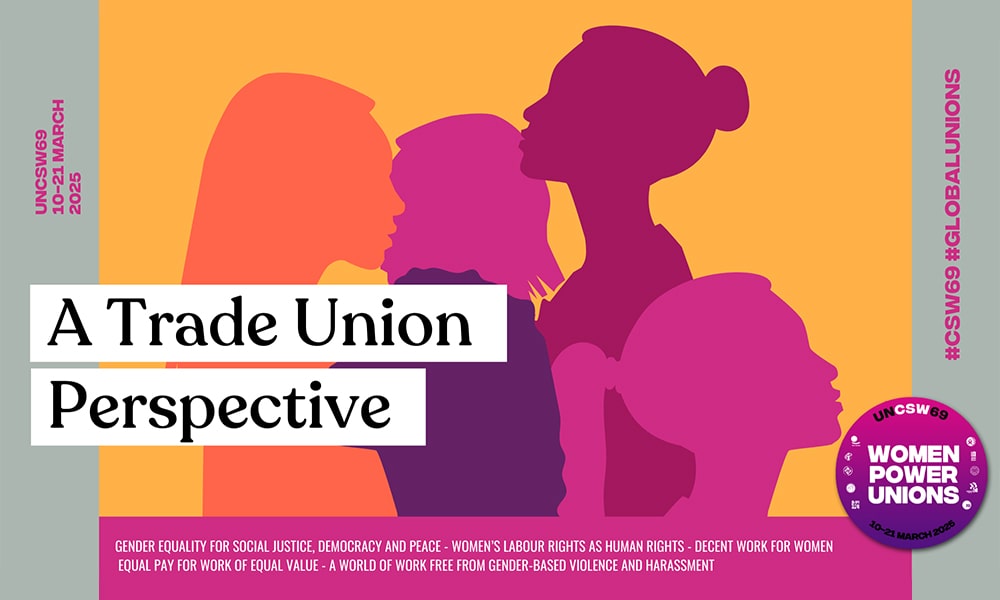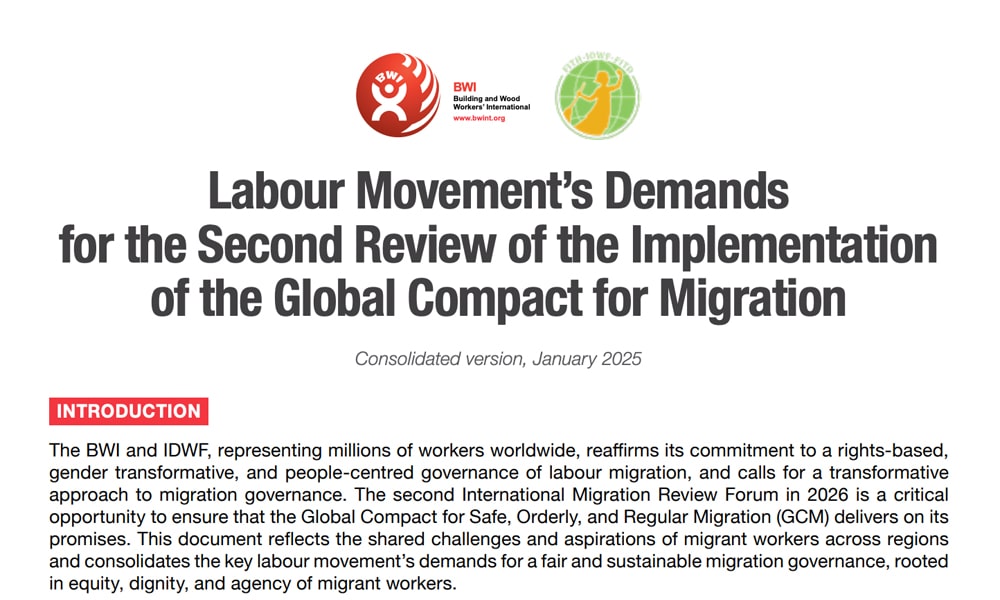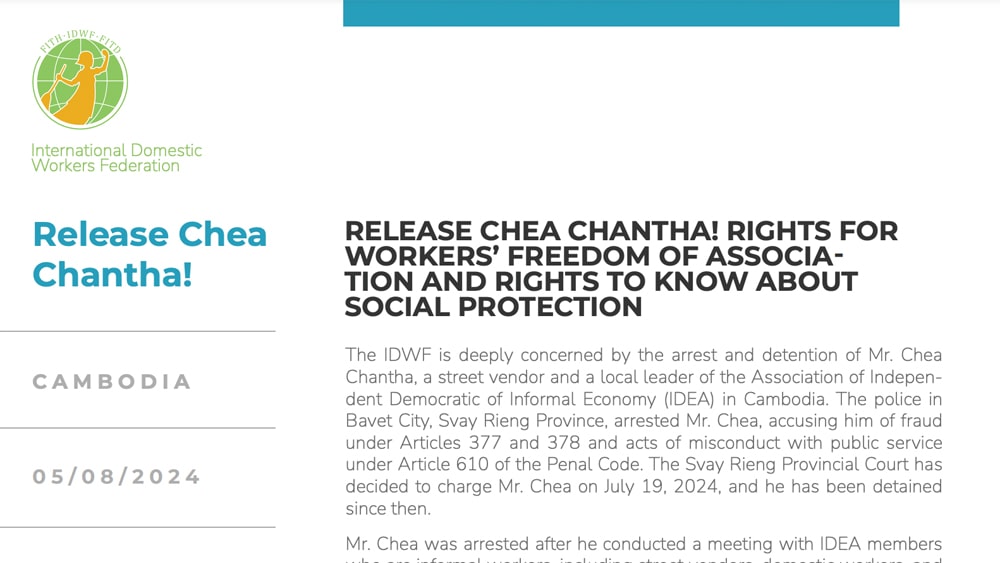112th Session of the International Labour Conference
Agenda item VI: Decent work and the care economy
June 2024
Domestic Workers and the Care Economy
- Key aspects and components of the care economy
Care is the foundation upon which life itself exists –it is necessary for humans, societies, and economies to function. The IDWF supports the definition of care highlighted in the ILO report1 on Decent Work and the Care Economy which states that care work is crucial for the future of decent work, and that it consists of both paid and unpaid work, and it includes direct and indirect care.
Care work is delivered throughout the life cycle, ensuring sustainability and quality of life. Care is the link between production and reproduction processes since care work is the backbone that makes all other paid work possible. Despite its vital importance, the central place of care in the provision of well-being has remained invisible in the mainstream economy.
The current social organization of care reflects profound inequalities that are rooted in slavery, ownership and disenfranchisement of people from the Global South. Such inequalities are expressed through differentiated social and economic status and positions of power that are often used to exploit the labor of racialized women and girls, migrant women, and women working in informal settings. The unequal organization of care is both a driver and outcome of poverty and structural inequalities, with implications for the rights and well-being of those providing and receiving care.
There is a need to reach a common understanding of the care economy in order to create a conducive policy environment that promotes decent work for workers in care sectors, workers with family responsibilities, gender equality and social and economic justice. An integrated approach recognizes care as a public good rather than as women’s responsibility and as a human right2. In this line we endorse the ILO’s 5 Rs framework that conceives care from a rights-based and gender-responsive approach to public policy that generates citizenship, promotes formalization of jobs and decent work conditions in the care economy.
The need for care has been on the rise, the availability of unpaid work to meet household care needs has decreased, and there is a growing need for quality public care services. Domestic workers (DWs) provide services and goods that are socially necessary for the maintenance of the households and the well-being of families, most often in the form of either direct (face-to-face personal care) or indirect care activities (including tasks such as cooking, cleaning, and other work that ensures a healthy and safe living environment). In light of a growing care burden that falls on families (especially on women and girls) a critical portion of the care burden is outsourced to domestic workers. Domestic work enables others to join the labor force and contribute to economic growth.
Domestic workers are a key pillar of the care economy, considering only those employed directly by households; they account for 25% of all care workers. Around the world, 75.6 million DWs are aged 15 years and over3.
Domestic workers have a long tradition of organization and mobilization to recognize care work—performed for households—as work and their rights as workers. This legacy informs the current conceptualization of care work as work, which is also ingrained in the ILO Convention 189 on Decent Work for Domestic Workers. Promoting decent work for DWs must be at the core of a care economy agenda and policy.
- Gaps in decent work coverage and access to care provisions for domestic workers
The undervalued nature of care work also has ramifications for paid care workers. Despite the relevant contribution that DWs provide to the care economy, societies continue to place a low social and economic value on domestic work; it is often considered unskilled and an extension of women’s unpaid care work. Compared to most other wage workers, DWs tend to have lower wages, fewer benefits, and fewer legal or social protections. Very few DWs have labor contracts. They usually have no maternity leave, health care or pension provision. Temporary migration policies and schemes lead to a structural suppression of DWs labor rights. The undervaluation and under-recognition of DWs must change to reflect their invaluable role in supporting households, economies, societies and enable them to enjoy their human rights.
Certain categories of DWs face greater disadvantages. Live-in DWs experience more isolation, less privacy and more limited mobility, work longer hours, and receive a larger share of payments in kind (such as meals and accommodation). Living conditions are frequently poor. They are also more vulnerable to physical/sexual abuse by employers compared to live-out DWs. Many DWs face multiple forms of discrimination due to their gender, race, ethnicity, class, migratory status and other individual characteristics that “intersect” with one another and overlap. Gaps in protection and enjoyment of rights are more pronounced among these groups.
- Legal exclusion
Domestic workers face high levels of discrimination by law. In several countries, households are not recognized as workplaces, and DWs are not recognized as workers. Worldwide, 36.1% of DWs are excluded from national labor legislation, and 50.1% have no legal entitlement to social security. Nearly half of DWs remain excluded from specific provisions limiting normal weekly hours of work (48.9%). Almost half (46%) are not legally entitled to a minimum wage. A large proportion of women DWs are excluded from maternity leave provisions (46.5%) and entitlements to maternity cash benefits (47.6%), and even more are excluded in practice because of their informal status4.
- Lack of and insufficient Implementation
In addition to legal exclusion, multiple barriers prevent the implementation of the law and its compliance. Only a few DWs enjoy rights and protection in practice: 81.2% of DWs (61.4 million) remain in informal employment.
- Skills not recognized
Despite performing a wide range of skilled tasks around the home, domestic work is often dismissed as “unskilled” work (a justification to underpayment and lack of decent working conditions). A study conducted by the ILO in 2023 compared the tasks that DWs perform in homes against the International Standard Classification of Occupations (ISCO) and found that almost all DWs are operating at a medium skill level (level 2), far higher than ‘unskilled’5.
- Child domestic work
7.1 million children aged 5 to 17 years are engaged in child labor in domestic work. This includes 4.1 million children between the ages of 5 and 11 years, 1.1 million children between the ages of 12 and 14 years and 2.0 million children between the ages of 15 and 17 years. They are highly vulnerable to physical, sexual, psychological or other forms of abuse, harassment and violence.6
- Forced Labor
Domestic work is among the five sectors accounting for the majority of total adult forced labor, and one of the main sectors where children in forced labor are found. Domestic workers are the most vulnerable and exploited because of the isolated nature of the work and its close link to trafficking. The share of migrants in the group of people in forced labor is much higher than that of migrants in the overall labor force. Migrant DWs are more prone to forced labor, particularly in countries where they are nor protected by law or unable to exercise their rights, or where regular migration channels are restricted by law or practice. Women in forced labor are much more likely than their male counterparts to be in domestic work and to be coerced through wage non-payment and abuse of vulnerability. Indicators of involuntariness include being unable to quit the job, having to stay in the job longer than agreed, and being made to work without overtime pay, among others7.
- Migration
The growing demand for care in many countries has led to dependency on migrant domestic workers to cover care gaps. Migrant domestic workers (MDWs) are often hired under conditions locals are not willing to accept. Even though their overseas work allows MDWs to support their families, they often lack basic conditions to ensure a safe migration and respect for migrant DWs’ human rights and decent work. MDWs working conditions and labor rights are often regulated not by national laws but rather by bilateral agreements (BLAs) and memorandums of understanding (MOUs) between countries of origin and destination, which usually results in discriminatory levels of protection. Temporary migration policies and schemes lead to a structural suppression of MDWs’ labor rights. Emigration policies discriminate in some countries against DWs, leading to irregular pathways of migration that increase risks of abuse and exploitation.
- Violence at work
As a consequence of multiple forms of discrimination, DWs are often subject to violence and harassment in their workplaces: economic abuse, psychological abuse, physical and sexual abuse, verbal abuse and lack of access to appropriate food. An IDWF study8 reveals that eight out of ten DWs suffer harassment and discrimination of some type in their work.
- Freedom of association: challenges faced by DWs organizations
In some countries, DWs are not allowed to organize or join trade unions (they fall outside the scope of law due to the definition of workers, workplaces or even employers). MDWs are often excluded. Beyond legal challenges, DWs face practical obstacles to their rights of voice and representation. The nature of the worker-employer relationship and the lack of a counterpart (employer’s organization) makes it difficult for DWs to negotiate collective bargaining agreements with their employers.
- Effective measures towards a sustainable and well-functioning care economy
- ILO Convention 189 sets minimum standards for decent work for DWs. As of May 2024, 36 countries have the Convention: 18 in Latin America and the Caribbean, 11 in Europe, 6 in Africa, and 1 in Asia9. That so few countries have ratified the DWs’ convention in most regions reflects how challenging it is to reform the sector. C189 should be recognized as a central pillar of a national care policy.
- Domestic work is care work, and it plays a crucial role in life reproduction and life sustenance therefore setting the pre-conditions and bases for national economies and societies to function10. DWs should be fully and explicitly recognized as workers, as part of the care workforce and as care providers, covered by national labor codes and protected in equal conditions compared with workers in other occupations. Decent work for DWs should be ensured, as well as access to complaint mechanisms and their right to organize. Discriminatory frameworks and practices they often face should be eradicated.
- Pathways to DWs formalization should be prioritized and their skills –acquired through training or experience– recognized, valued and fairly remunerated. Access to skills training linked to formal employment opportunities should be provided.
- Care must be seen as a human right; the right to self-care, the right to receive and provide care must be done in conditions that uphold decent working conditions so that providers and recipients of care can fully realize this right. DWs labor rights and social protection should be ensured. As workers with family responsibilities, they should enjoy effective access to social protection benefits and measures, including maternity protection and the full set of rights and mechanisms to ensure their rights to care and to care services.
- Care should be recognized as a public good, operating on principles of solidarity, equity and universality and the leadership of the State. Increased public investments in care under a rights-based approach are necessary to ensure decent work for DWs and their access to care.
- Labor shortages in the care sector must be addressed through rights-based schemes, coherent care and migration policies that recognize MDWs’ rights to enjoy the same rights as other workers and their entitlement to decent work.
- Rights-based migration pathways should empower and protect domestic workers through open work permits covered by labor and social protection regulations while offering permanent residency status in the country of destination and family reunification avenues. Bi-lateral agreements should be based upon C189 standards, MDWs should have access to core labor standards (freedom of association, non-discrimination, OSH, fair wages, access to justice mechanisms and protection from GBVH), social protection, portability of social security benefits and their skills formally recognized for the purpose of determining labor conditions, including wage11. Emigration policies should be developed with a gender lens in order to ensure DWs have their right to a free and safe migration with rights.
- Domestic workers have a long tradition of organizing unions and collective action. The founding of the International Domestic Workers Federation (IDWF) in Montevideo in 2013 revealed the global expansion of the domestic workers’ movement, built upon new connections between existing national and regional organizations composed (exclusively) of domestic workers. The IDWF represents more than 670,000 domestic workers through 88 affiliates in 68 countries worldwide. IDWF is the result of domestic workers’ long-term mobilization for their rights. The founding of a global federation of domestic workers is a sign of the growing strength of the movement and a key moment to assess progress for workers long excluded from basic labor protections. The IDWF has played a vital role in building the capacity of fledgling domestic workers organizations around the world. This has included the founding of new unions of domestic workers in several countries.
- Institutionalized social dialogue spaces among workers, employers and government are essential to advancing rights and protections. Employers of DWs should be encouraged to create their own organizations as a precondition for expanding social dialogue.
- The regions and countries that have been able to advance and secure labor rights and social protections are those where freedom of association is permitted in law and in practice. Domestic workers are key partners to be consulted for the elaboration of any policy or legal reform concerning their situation and care policies12.
- ILO Office related action
IDWF wishes to request the following support:
- Further efforts should be made to ensure the ratification and effective implementation of Convention 189 to address decent work deficits among DWs. IDWF wishes to request the ILO Office to scale up promotional campaigns and technical assistance for Member States that have not yet ratified C189, as well as technical support and guidance on the application of C189 for those Member States that have already ratified C189.
- The ILO should provide technical support, guidance and training to its tripartite constituents to strengthen the capacity for social dialogue mechanisms to address DWs’ decent work deficits and effectively guarantee DWs’ voice and representation.
- IDWF wishes to request the ILO to provide policy guidance and training to the tripartite constituents on the development of national policy frameworks, roadmaps and action plans on the care economy that promote the incorporation of decent work for DWs and their right to care as a core component of national care policies13.
- The ILO has made key contributions to developing comprehensive work on the care economy, providing valuable inputs to promote decent work for DWs. We support the continuation of ILO research and data development in this area and the inputs to be provided to the necessary process to reach a tripartite common understanding of the care economy guided by ILO’s 5R framework.
During the IV Congress (2023), IDWF adopted the following Combined Resolution on the Care Economy14.
Domestic Workers as Care Workers, and with the right to Child Care and Elderly Care Support
Based on the resolutions proposed by the IDWF Congress in 2018, the Jamaica Household Workers Union (JHWU), and IDWF affiliates in Asia and the Americas in 2023.
Acknowledging:
That a discussion about the social and economic value of care is being held at a global level and 75.6 million domestic workers (who account for approximately 25% of the global paid care workforce providing both direct and indirect care for private families) constitute a major part of paid care workers across many different contexts.
That in the global debate of care, international organizations, and such a the ILO and the UN, have regarded care as a right—“the right to care”—as fundamental premise for the sustainability of societies and national economies, especially in post-pandemic times.
Recognising:
That the COVID-19 pandemic has evidenced the social and economic value of care. While all economic activities came to a halt, care work never stopped and was essential to save lives and keep households functioning. Despite this, the working conditions of domestic workers have deteriorated (confinement, layoffs, reduced working hours, lower wages, and cancellation of social security registration). In addition, domestic workers have been subjected to harassment and gender-based violence.
That the demand for care for dependent persons (children, older adults, persons with disabilities and sick persons) requires a growing workforce that is properly trained to provide the necessary care.
That a significant number of domestic workers globally are migrant workers (the ILO estimates this at one in five domestic workers worldwide), which comprises ‘global care chains. Migrant domestic workers either work legally in a country or lack the relevant documentation. If they are in informal employment, they are doubly “illegal” due to their migration status and their informal job.
That women have massively entered the labour market yet care
responsibilities have not been redistributed in households, which means that women have an excessive daily workload, with the poorest and most racialized women being worst off.
That the right to childcare is recognized in ILO Convention 102 on Social Security, ILO Convention 156 on Workers with Family Responsibilities, ILO Convention 183 on Maternity Protection and ILO Convention on the Decent Work for Domestic Workers as key relevant labour standards.
That older domestic workers face highly vulnerable living conditions, because their jobs developed in poor working conditions with no access to social security, so they do not have access to retirement benefits or their retirement benefits are extremely low, while most of them have no access to free healthcare services let alone to protection and care services, and many of them are living in poor conditions,
That not only are domestic workers providers of care services but also provide unpaid care work for their families and communities, and as a consequence they and their families also have care needs themselves, which should be addressed by societies and governments.
Concerned:
That in the present global Care debate and narrative, the presence, contribution and the care work burden borne by domestic workers is rarely acknowledged.
That the initiatives around Care by the IDWF affiliates are currently isolated from one another and focusing on the national context.
That few governments have developed comprehensive Care policies and programmes to guarantee the right to care for all, the rights of care providers, the co-responsibility of the State, and the required cultural changes. Domestic workers should be part of a comprehensive system that recognizes their rights as care providers and also provides care to all domestic workers needing care.
THEREFORE, BE IT RESOLVED THAT THE IDWF:
Reinforces strategic alliances with the Global Union Federation (GUF) and the Global Alliance on Care (The GAC) and forms additional strategic alliances with other unions, federations, associations of care workers, and coalitions working on care when necessary with the aim of integrating domestic workers into the global “care” agenda – recognizing rights of domestic workers as care workers;
Participates in key strategic meetings with government bodies and departments, UN agencies (including the ILO), civil society and the private sector to amplify the voices of domestic workers and assert our presence in these platforms on the Care economy.
Creates a global, coordinated campaign on Care focusing on the informal sector and domestic workers, leveraging the 5Rs (Recognize, Reduce, Redistribute, Reward and Represent) as a global campaign on care economy.
To Achieve the Objectives where governments recognize all Domestic Workers as Care Workers and implement solutions to provide appropriate care to dependent persons, ensuring that care work is safe, decent, and well-paid, including training and professional development for workers. This includes:
- The integration of domestic workers into a comprehensive care system as care providers and receivers.
- Supporting initiatives and advocacy efforts of affiliates aimed to secure provision of affordable public quality childcare services as part of national social protections systems in the world, if that does not already exist, and to campaign for such policies to be developed and implemented.
- Advocating and ensuring that access to maternity leave benefits for domestic workers are part of the national social protection schemes and are implemented in practice.
- Securing access to retirement benefits for older domestic workers, as well as access to free healthcare services and care programmes, plus policies aimed at eliminating all forms of discrimination affecting older domestic workers’ continued labour.
- Appropriately addressing the housing situation of retired domestic workers.
- Programmes and special protection for migrant domestic workers (including undocumented migrant workers).
- The ratification and implementation of ILO Convention 189 to ensure minimum social and labour protection for all domestic workers.
Download here
English French Spanish Portuguese
Footnotes
-
ILO Decent Work and the Care Economy
https://www.ilo.org/resource/conference-paper/decent-work-and-care-economy -
The Centrality of Care and Support from a Human Rights Perspective
https://idwfed.org/wp-content/uploads/2024/04/HCHR-draft-5-APR-ENG.pdf -
ILO. (2024, March). From global care crisis to quality care at home: The case for including domestic workers in care policies and ensuring their rights at work.
https://www.ilo.org/wcmsp5/groups/public/—ed_protect/—protrav/—travail/documents/publication/wcms_916326.pdf -
ILO. (2021). Making Decent Work a Reality for Domestic Workers: Progress and Prospects Ten Years after the Adoption of the Domestic Workers Convention, 2011 (No. 189).
https://www.ilo.org/wcmsp5/groups/public/—ed_protect/—protrav/—travail/documents/publication/wcms_802551.pdf -
ILO (2023). Skilled to care, forced to work? Recognizing the skills profiles of migrant domestic workers in ASEAN amid forced labour and exploitation.
https://www.ilo.org/wcmsp5/groups/public/—asia/—ro-bangkok/documents/publication/wcms_885139.pdf -
ILO. (2021). Making Decent Work a Reality for Domestic Workers: Progress and Prospects Ten Years after the Adoption of the Domestic Workers Convention, 2011 (No. 189).
https://www.ilo.org/wcmsp5/groups/public/—ed_protect/—protrav/—travail/documents/publication/wcms_802551.pdf -
ILO, Walk Free, & IOM. (2022, September). Global Estimates of Modern Slavery: Forced Labour and Forced Marriage. ILO.
https://www.ilo.org/publications/major-publications/global-estimates-modern-slavery-forced-labour-and-forced-marriage -
IDWF. (2018b, June). Platform of Demands: Violence and harassment against women and men in the world of work. IDWFED.
https://idwfed.org/wp-content/uploads/2022/07/international_labour_conference_107th_session_en.pdf - These countries are in Latin America and the Caribbean: Argentina, Antigua and Barbuda, Bolivia, Brazil, Chile, Colombia, Costa Rica, Dominican Republic, Ecuador, Granada, Guyana, Jamaica, Mexico, Nicaragua, Panama, Paraguay, Peru, Uruguay; In Africa: Guinea, Madagascar, Mauritius, Namibia, Sierra Leone, and South Africa; In Europe: Germany, Belgium, Finland, Ireland, Italy, Malta, Norway, Portugal, Spain, Sweden, Switzerland; In Asia: Philippines
-
ILO. (2024, March). From global care crisis to quality care at home: The case for including domestic workers in care policies and ensuring their rights at work.
https://www.ilo.org/wcmsp5/groups/public/—ed_protect/—protrav/—travail/documents/publication/wcms_916326.pdf -
ILO (2023). Skilled to care, forced to work? Recognizing the skills profiles of migrant domestic workers in ASEAN amid forced labour and exploitation.
https://www.ilo.org/wcmsp5/groups/public/—asia/—ro-bangkok/documents/publication/wcms_885139.pdf -
The Buenos Aires Commitment, adopted by Latin America and the Caribbean Member States, agreed to “actively support the participation of … organizations of paid domestic workers …in the design, implementation and monitoring of care policies”
https://repositorio.cepal.org/server/api/core/bitstreams/5d94a78a-b8ac-487e-bfba-214ed496c68b/content -
The ILO “Roadmap: Investing in Care to Make Domestic Work Decent Work”, adopted by several Latin American Member States, provides guidance to achieve decent work in the care sector, particularly for domestic workers.
https://www.ilo.org/es/publications/hacer-del-trabajo-domestico-un-trabajo-decente-invertir-en-cuidado-una -
IDWF Resolutions adopted in the 4th Congress, October 2023.
https://idwfed.org/wp-content/uploads/2024/05/IDWF-Resolutions-2023-EN-V.2.pdf






